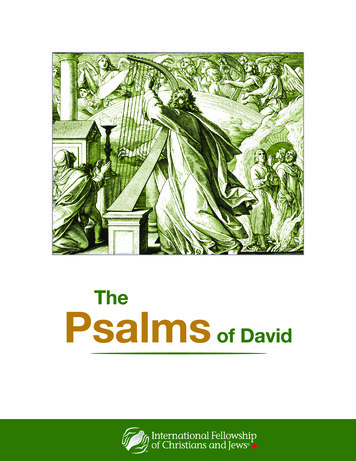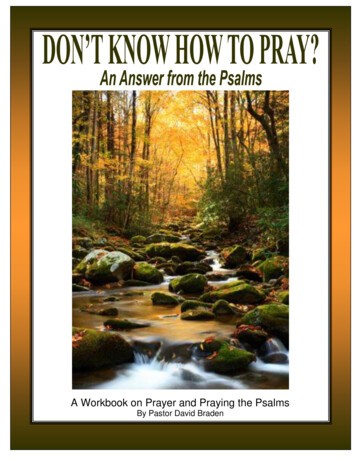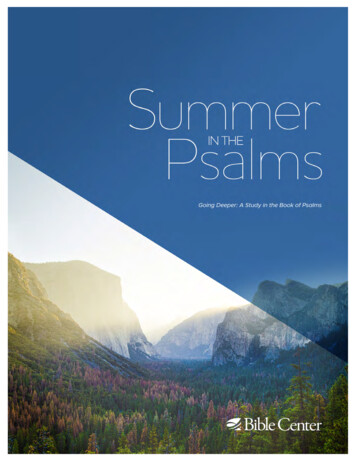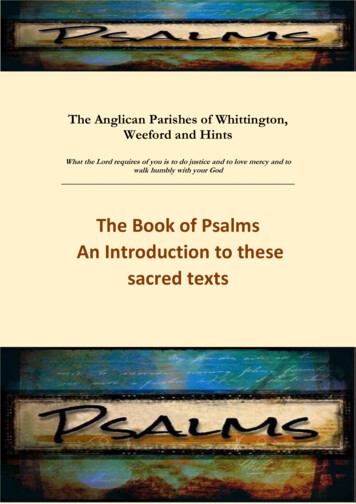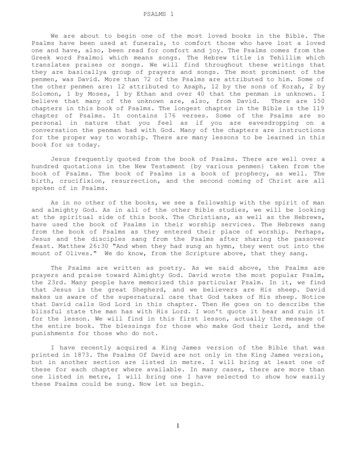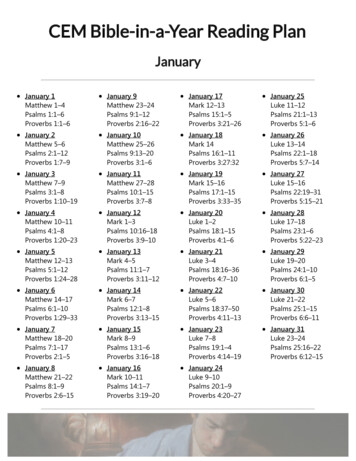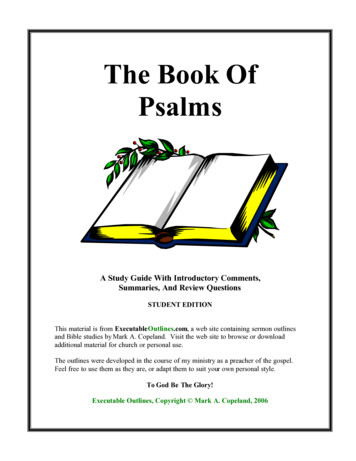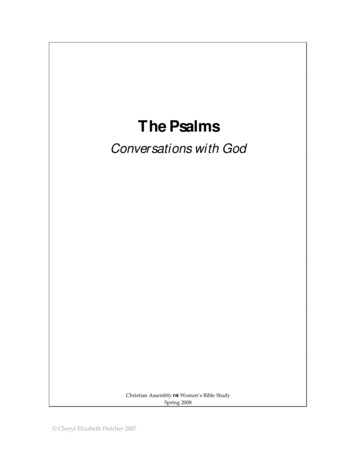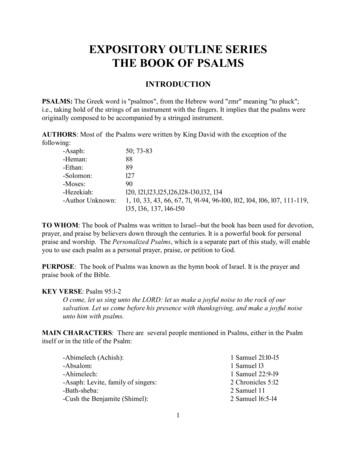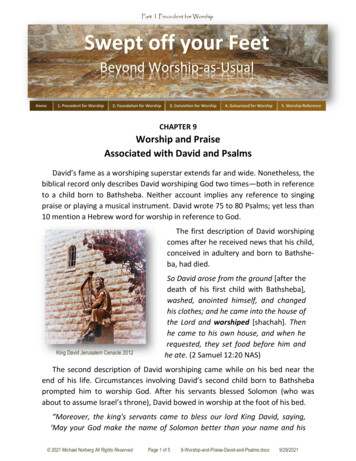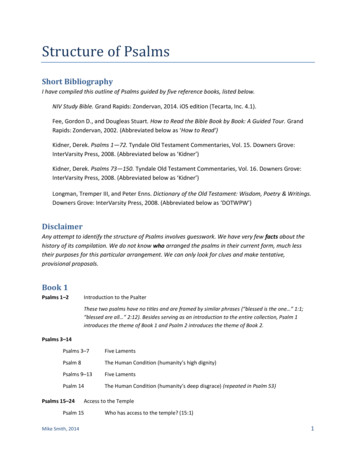
Transcription
Structure of PsalmsShort BibliographyI have compiled this outline of Psalms guided by five reference books, listed below.NIV Study Bible. Grand Rapids: Zondervan, 2014. iOS edition (Tecarta, Inc. 4.1).Fee, Gordon D., and Dougleas Stuart. How to Read the Bible Book by Book: A Guided Tour. GrandRapids: Zondervan, 2002. (Abbreviated below as ‘How to Read’)Kidner, Derek. Psalms 1—72. Tyndale Old Testament Commentaries, Vol. 15. Downers Grove:InterVarsity Press, 2008. (Abbreviated below as ‘Kidner’)Kidner, Derek. Psalms 73—150. Tyndale Old Testament Commentaries, Vol. 16. Downers Grove:InterVarsity Press, 2008. (Abbreviated below as ‘Kidner’)Longman, Tremper III, and Peter Enns. Dictionary of the Old Testament: Wisdom, Poetry & Writings.Downers Grove: InterVarsity Press, 2008. (Abbreviated below as ‘DOTWPW’)DisclaimerAny attempt to identify the structure of Psalms involves guesswork. We have very few facts about thehistory of its compilation. We do not know who arranged the psalms in their current form, much lesstheir purposes for this particular arrangement. We can only look for clues and make tentative,provisional proposals.Book 1Psalms 1–2Introduction to the PsalterThese two psalms have no titles and are framed by similar phrases (“blessed is the one ” 1:1;“blessed are all ” 2:12). Besides serving as an introduction to the entire collection, Psalm 1introduces the theme of Book 1 and Psalm 2 introduces the theme of Book 2.Psalms 3–14Psalms 3–7Five LamentsPsalm 8The Human Condition (humanity’s high dignity)Psalms 9–13Five LamentsPsalm 14The Human Condition (humanity’s deep disgrace) (repeated in Psalm 53)Psalms 15–24Access to the TemplePsalm 15Mike Smith, 2014Who has access to the temple? (15:1)1
Psalm 16Trust in God / Joy in his presencePsalm 17Plea for deliverancePsalm 18Prayer and praise for the king’s deliverancePsalm 19Psalms 20–21Psalm 22Psalm 23Psalm 24Psalms 25–33Glory of God revealed in creation and His lawPrayer and praise for the king’s deliverancePlea for deliveranceTrust in God / Joy in his presenceWho has access to the temple? (24:3)Pleas for mercy and trust in God’s unfailing lovePsalm 25Prayer for God’s deliverance (acrostic)Psalm 26Prayer of a blameless personPsalm 27Appeal to God regarding false accusersPsalm 28Prayer of one going “down to the pit”Psalm 29Psalm 30Psalm 31Psalm 32Psalm 33God’s power seen in a thunderstormPraise from one spared from going “down to the pit”Appeal to God regarding false accusersBlessedness of those forgivenPraise for God’s deliverance (acrostic)Psalms 34–37Psalm 34Psalm 35Appeal against the WickedPsalm 36Appeal against the WickedPsalm 37Psalms 38–41Instruction in Godly WisdomInstruction in Godly WisdomFour Laments: Prayer and Confession of SinsBook 2In Book II, “Elohim largely replaces the name Yahweh.” The Book ends with thepostscript of Psalm 72:20 — “This concludes the prayers of David son of Jesse”, eventhough there are an additional eighteen psalms by David after this, and a dozen by otherauthors in the first two Books. [Kidner, 18]“Psalms are brought together here from various sources: the Sons of Korah, who weretemple musicians (42 – 49); Asaph, the founder of another temple group (50); DavidMike Smith, 20142
(51 – 65; 68 – 70); Solomon (72). There are also three anonymous psalms: 66, 67, 71.”[Kidner, 182]Psalms 42–45Three prayers and a royal psalm “in perfect balance with the ending of Book II”Psalms 42–43Prayer for deliverance from enemiesPsalm 44Communal prayer after defeatPsalm 45A royal weddingPsalms 46–48Psalm 46Security in ZionPsalm 47Psalm 48Yahweh’s Worldwide ReignSecurity in ZionPsalms 49–53Psalm 49Folly of Trusting in WealthPsalm 50God Calls His People to AccountPsalm 51An Individual Brought to AccountPsalm 52Folly of Trusting in WealthPsalm 53Folly of the Wicked (Compare with Psalm 14)Psalms 54–60This is the central cluster of Book IIPsalm 54Individual Prayer for DeliverancePsalm 55Prayer for Help against ConspiracyPsalm 56Confidence that God Will Deliver from the WickedPsalm 57Psalm 58Psalm 59Psalm 60Psalms 61–64God Is Exalted by His Saving Acts (central Psalm of Book II)Confidence that God Will Judge the WickedPrayer for Help against ConspiracyCommunal Prayer for DeliveranceFour psalms expressing confidence in God’s deliverancePsalms 65–68Psalm 65Praise for God’s Care of CreationPsalm 66Praise for God’s Saving ActsPsalm 67Praise for God’s Care of CreationPsalm 68Praise for God’s Saving ActsMike Smith, 20143
Psalms 69–72Psalm 69Prayer for Deliverance from EnemiesPsalm 70Prayer for Deliverance from Enemies (repeats Psalm 40:13–17 with some revision)Psalm 71Prayer for Deliverance from EnemiesPsalm 72Royal Psalm for Blessings on the King (with Psalm 2 an inclusion for Books I & II)Book 3Book III consists of three groupings of psalms, having an overall symmetrical pattern (sixpsalms [73–78], five psalms [79–83], six psalms [84–89]) and at its center (Psalm 81) anurgent exhortation to fundamental covenant loyalty to The Lord. [NIV Study Bible]Psalms 73–78Psalm 73Wisdom from an individual’s lifePsalm 74Psalm 75Assurance that God judges the wickedPsalm 76Assurance that God judges the wickedPsalm 77Psalm 78Individual’s prayer when rejected (invokes God’s saving in the Exodus)Community’s prayer when rejected (invokes God’s saving in the Exodus)Wisdom from the community’s lifePsalms 79–83Psalm 79Community prayer against enemy invasionPsalm 80Prayer to restore IsraelPsalm 81Psalm 82Psalm 83Admonition to covenant loyalty (center of medley and book)Prayer to judge the earthCommunity prayer against enemy invasionPsalms 84–89Psalm 84Yearning for fellowship with God (introduces the following five psalms)Psalm 85Communal cry of distressPsalm 86Individual cry of distressPsalm 87Psalm 88Psalm 89Mike Smith, 2014God's special love for ZionIndividual cry of distressCommunal cry of distress4
“The two final prayers (Ps 88; 89) both end unrelieved by the usual expression of confidence thatGod will hear and act” [NIV Study Bible]Book 4Book III may stand as the editorial center of the entire corpus. Royal psalms in the firsthalf of the Psalter (1–89) appear to rehearse the story of the Davidic monarchy. Psalms90–106 reorient the theological message of the Psalter. The first of the group, Psalm 90,lists Moses in the superscription, a time in Israel’s history when the nation was led byonly one king, Yahweh. Of the seventeen psalms in this collection, six are enthronementpsalms (93; 95–99). The final two are historical psalms, recounting the faithfulness ofYahweh in the deliverance of his people out of Egypt. These psalms are meant to counterthe crisis of exile, reasserting belief in the reign of Yahweh, even with the apparentabsence of a human king. [DOTWPW, 590]Psalms 90–100 The LORD Reigns!Psalms 90–91Psalm 90Point: We are consumed by God’s angerPsalm 91Counterpoint: Those who take refuge in the Lord are safePsalms 92–94Psalm 92The Lord will repay the wickedPsalm 93Psalm 95The Lord reignsThe Lord will repay the wickedPsalms 95–99Psalm 95Do not harden your heartsPsalm 96The Lord will judge the worldPsalm 97The Lord is good to IsraelPsalm 98The Lord will judge the worldPsalm 99The Lord is good to IsraelPsalm 100The Lord is God; the Lord is goodPsalms 101–110The traditional division between Books IV and V at Ps 107 was probably done by a latercompiler, breaking up the collection consisting of Ps 101 – 110. [NIV Study Bible]Mike Smith, 20145
Psalm 101A king’s vow to GodPsalm 102Prayer of an individual in distressPsalm 103Praise for the Lord’s great lovePsalm 104Psalm 105History of Israel’s redemptionPsalm 106History of Israel’s rebellionPsalm 107Psalm 108Psalm 109Psalm 110God’s wonderful acts in creationGod’s wonderful deeds for peoplePraise for the Lord’s great lovePrayer of an individual in distressGod’s vow to a kingBook 5Apart from the doxology at the end of Psalm 106 there is little if anything to mark offthis final book from its predecessor. Within it, however, there are certain obviousgroupings: two collections of Davidic psalms (108—110; 138—145); the fifteen Songs ofAscents (120—134) . . . Jewish tradition also groups together Psalms 113—118, knownas the ‘Egyptian Hallel’, for use at the Passover. [Kidner 417]Psalms 107–110See last grouping in Book 4.Psalms 111–119The ‘Egyptian Hallel’ is enclosed within alphabetic acrostics. Each half line ofPsalms 111 and 112 begin with a different letter of the alphabet. In Psalm 119,the alphabet advances through its twenty-two sections, with each of the eightlines in a section beginning with the same letter.Psalm 111Praise for God’s great deedsPsalm 112Praise for God’s good blessingsPsalms 113–118Mike Smith, 2014The ‘Egyptian Hallel.’ At Passover, Psalms 113 and 114 were sung beforethe meal (before the second cup was passed) and Psalms 115–118 afterthe meal (when the fourth cup had been filled). [NIV Study Bible]Psalm 113Praise of the exalted Lord’s care for the lowlyPsalm 114A hymnic celebration of the exodusPsalm 115Yahweh contrasted with idolsPsalm 116Praise for deliverance from deathPsalm 117Praise for his love and faithfulness6
Psalm 118Psalm 119Psalms 120–137Thanksgiving for deliverance from enemiesPraise for God’s instruction (Torah)This grouping includes the ‘Songs of Ascent’ (120–134) and the traditional Jewishgrouping, the ‘Great Hallel’ (120–136), and ends with lament that worship inZion is no longer possible.Psalms 120–134Songs of Ascent, to be sung by those making the pilgrimage toJerusalem for the three annual feastsPsalms 135–137Psalm 135A salvation-history psalm of praisePsalm 136A salvation-history liturgy of praisePsalms 135 and 136, as different as they are, bothassume the pilgrims’ arrival at Yahweh’s sanctuary forworship. . .The final one (137) bemoans the reality of theexile when pilgrimage was not possible. [How to Read,142]Psalm 137Psalms 138–145Lament that worship in Zion is no longer possibleA final collection of Davidic psalmsPsalm 138Praise for God’s saving helpPsalm 139Praise for God’s wonderful knowledgePsalm 140Prayer for deliverance from enemiesPsalm 141Prayer for deliverance from enemiesPsalm 142Prayer for deliverance from enemiesPsalm 143Prayer for deliverance from enemiesPsalm 144Prayer for deliverance from enemiesPsalm 145Psalms 146–150Praise for God’s goodness (an alphabetic acrostic)Conclusion to the PsalterPsalm 146Praise for God’s care for the helplessPsalm 147Praise for God’s care for creation (and especially his people)Psalm 148Call for heaven and earth to praise YahwehPsalm 149Call for his people to praise YahwehPsalm 150Climactic call for all to praise YahwehMike Smith, 20147
Mike Smith, 2014 5 The two final prayers (Ps 88; 89) both end unrelieved by the usual expression of confidence that God will hear and act [NIV Study Bible] Book 4 Book III may stand as the editorial center of the entire corpus. Royal psalms in the first half of the Psalter (1–89) appear to rehearse

